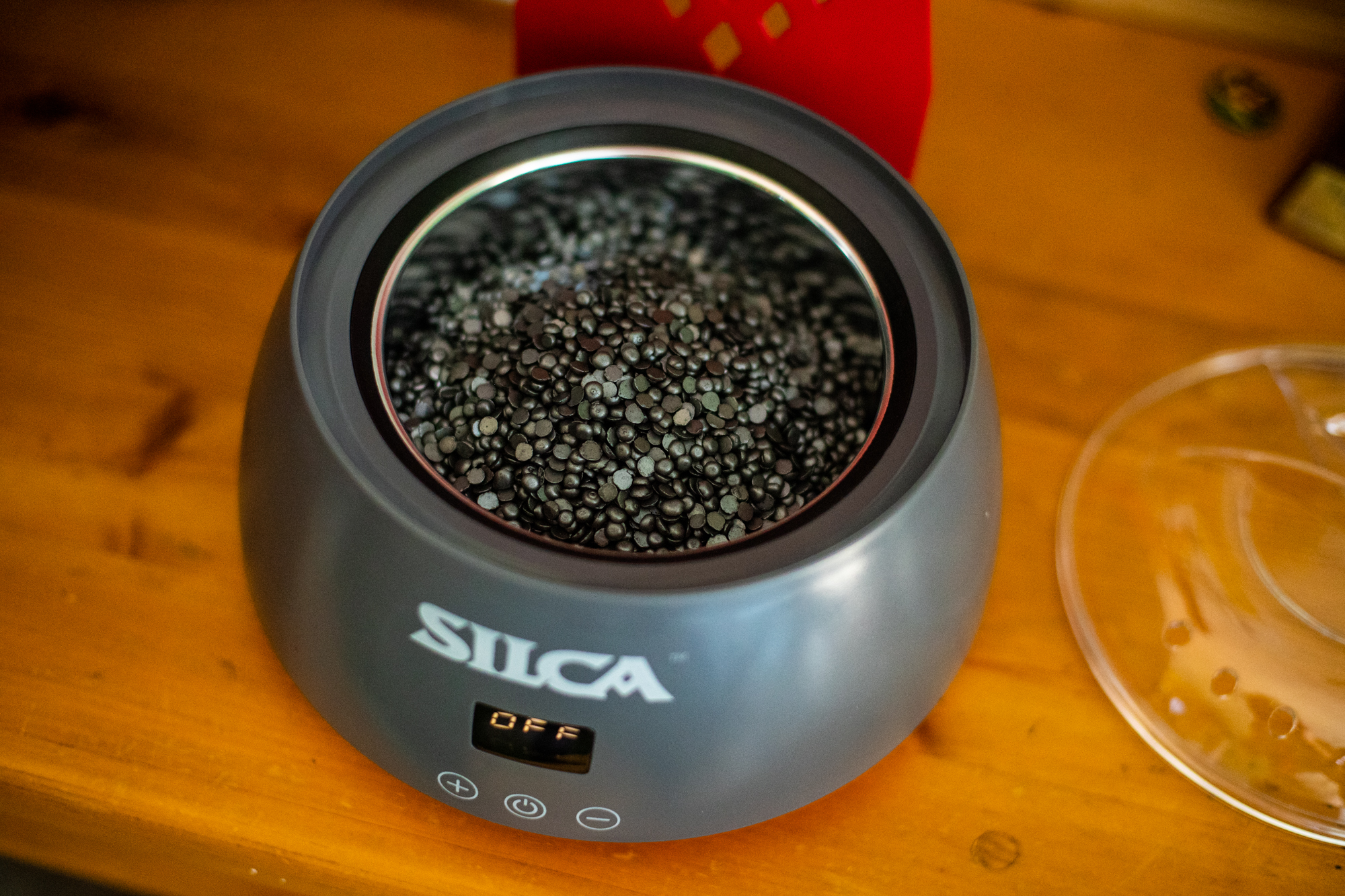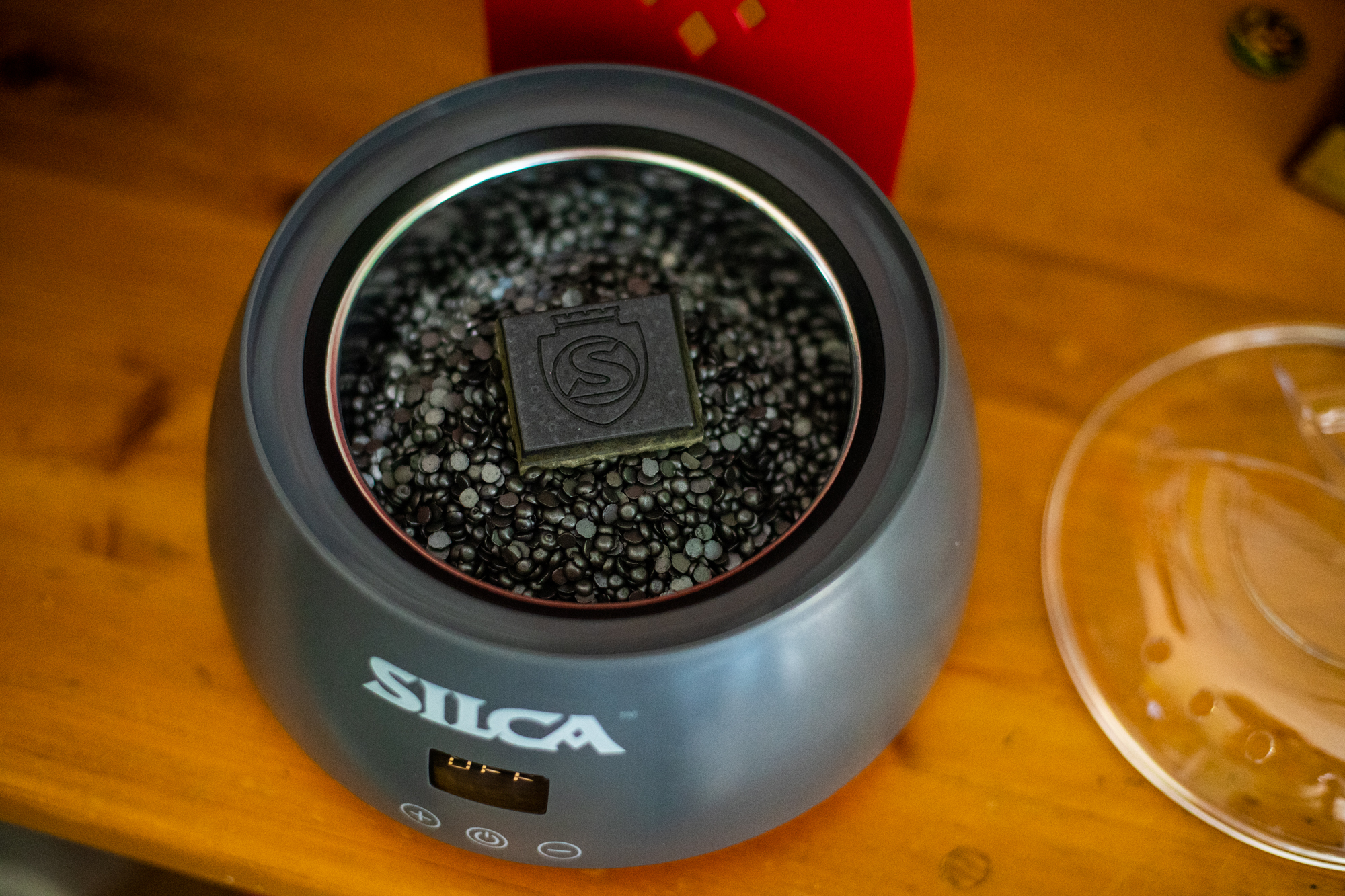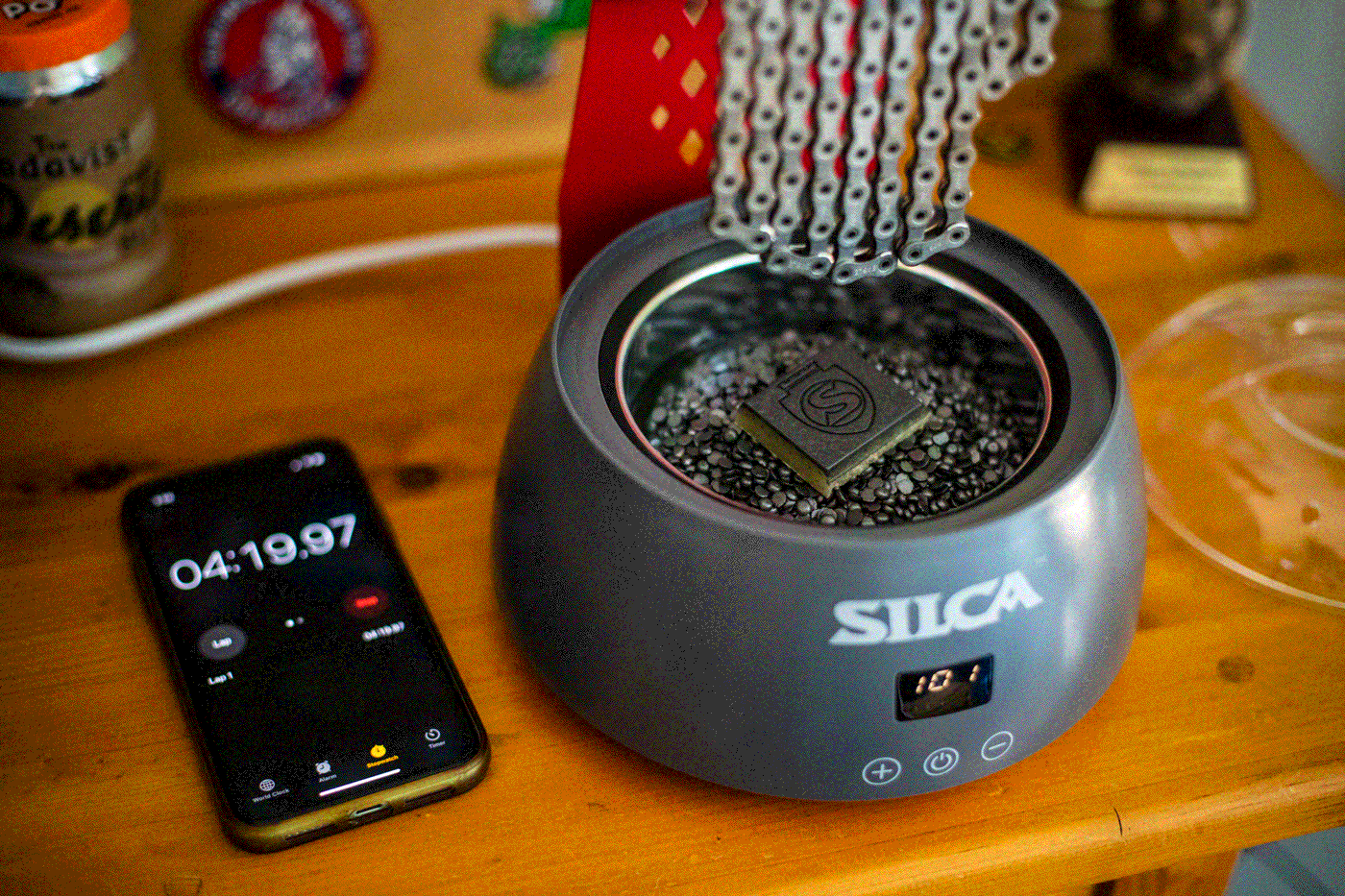
|
Echelon Sports Pty Ltd |
|---|
Drawing an analogy between bike maintenance and brewing coffee, Morgan Taylor goes deep in this Silca Chain Waxing System review. While those with ritualistic tendencies may be best suited to the hot wax process, Morgan suggests that waxing isn’t just for racers.
I really like coffee. I like drinking it, I like making it, and I like thinking about doing both of those things. Over the years I’ve honed in on a process that makes a consistent cup both at home and with a camp coffee setup. I buy decent locally-roasted beans, use a scale to weigh them to the gram, and grind them in a burr grinder right before brewing in a French press or Aeropress. Most people think I’m obsessive about making coffee, and I don’t deny that – and yet, I don’t own an espresso machine, which can be a whole other level of obsession.
Much like brewing coffee, you can maintain your bicycle in a lot of different ways. Some folks prefer simple methods, while others are completely obsessive. Some methods are inexpensive and easy to manage, while others require you to buy specialized equipment and learn how to get the best out of it. There are folks who love the ritual of making coffee or maintaining their bicycle, and there are folks who just want the bean water in their mouth and their chain to not squeak.

The Silca Chain Wax System is on the ritualistic end of the bicycle maintenance spectrum. While there are more steps to getting the job done than a simple drip-and-wipe, I’ve found I really like the process and the results. My favorite thing about using wax-based lubes is how clean your drivetrain stays, but I also like that drivetrain parts last longer when using wax based lubes.
I was a fan of Silca’s Marginal Gains podcast and their YouTube channel for a long time before taking the plunge into hot waxing. I pored over lubricant durability and wear test data on Zero Friction Cycling and saw the evidence, but it still took a leap of faith to jump to immersive wax. This past winter I finally picked up a thrift store crock pot, a bag of Silca Secret Chain Blend wax, and a bottle of Silca Chain Stripper, and I haven’t looked back.
As long as I remember to turn on the wax pot, the process of pulling the chain off a bike, running some boiling water over it to melt the old wax, dipping it in the wax pot, waiting for it to cool, and getting it back on the bike is only a few minutes of actual work. It’s mostly just waiting, which you can make and drink coffee while doing. So, what’s the deal with wax? Why is it so popular, and why is it so polarizing?

First, we need to consider what’s in a traditional chain lube. When you buy a traditional chain lube you’re looking at either a “wet” lube or a “dry” lube. A wet lube has lubricant additives suspended in a heavier oil, while a dry lube has those additives suspended in a lighter oil with a solvent that evaporates and leaves the lubricants, and ideally, less oil behind.
Wet lubes last longer, but attract more dirt. Dry lubes stay cleaner, but don’t last as long – particularly in extreme conditions. Both wet and dry lubes are applied by applying a drop of lube to each chain roller, cycling the chain, and wiping off the excess. The lubricants do their job on the inside of the chain rollers, not on the outside of the chain. Wet lubes are good to go right away, while dry lubes should be left for a few hours so the solvents can evaporate.
In both cases, oil-based lubes attract dirt and road grime. That contamination then gets inside the rollers of the chain, where lubrication is key. In a contaminated chain, lubrication occurs, but so does wear. Contaminants turn into a paste that grinds away at the inside surfaces of the rollers and plates, causing wear not only to the chain but the other drivetrain parts. In addition to costing you watts, dirty chains cost you actual money as your components all wear more quickly.

In contrast to oil-based lubes, wax-based lubes suspend lubricant additives in wax instead of oil. Just like the oil lubes, some wax lubes last longer, while others are easier to apply. In both cases wax based lubes do not attract contaminants, which keeps the outside of the chain clean – but more importantly, the inside as well.
The simplest to use wax lubes are drip waxes like Squirt and Silca Super Secret. Similar to oil-based “dry” lubes, the wax and lubricants are suspended in a solvent which needs to evaporate before you can ride it. Immersive or hot waxing, using a crock pot or the Silca Chain Wax System, involves taking the chain off the bike. The liquid wax completely fills the crevices inside the rollers, so it lasts longer than a drip wax.
It turns out you can use straight paraffin candle wax to quite impressive results, but if increased component longevity appeals to you, then the more expensive options like Silca or Molten Speed Wax are worth the upcharge. As I mentioned earlier, Zero Friction Cycling (ZFC) is an absolute goldmine of information bolstered by testing with rigorous protocols. (However, you might not like how your favorite oil based lubes perform.)

Speaking of protocols, you can read for hours and hours about how to prepare your drivetrain for wax. While I’ve known lots of folks to just start using a drip wax like Squirt on a previously-oiled drivetrain, I prefer to pull everything off the bike and clean it well. ZFC recommends starting with as new a chain as possible, but if you’re mostly after the cleanliness and not the maximum efficiency of wax, I say just go for it, within reason. I recently switched our cargo bike’s 11-speed Shimano CUES Linkglide drivetrain to wax at the 1000 mile mark.
The historical process for getting factory grease off a chain was a combination of turpentine and mineral spirits or acetone. This was messy, toxic, and took a number of cycles to get it all to work. I will admit that it was probably this phase that turned me off the most, and why only I started waxing after Silca’s one-step Chain Stripper and Wax Prep became available. We live in an apartment and I don’t enjoy having random bottles of chemicals around, but a Mason jar of Silca stripper is easy to manage.

I’ve got to give it to Silca for doing everything they can to make waxing easy. While my trusty old crock pot works just fine for re-waxing, Silca’s new Strip Chip product, when used with their wax pot, does away with the Chain Stripper step, and lets you put your factory new chain directly into the wax pot. The process is called oleogelation and it basically turns factory grease into a wax-like substance that doesn’t contaminate the clean wax. While I re-wax far more often than I use a fresh chain, most folks are best off making the shift to wax with a fresh chain, so Strip Chip removes a barrier to doing that.

You don’t want to use Strip Chip with a used chain, as the grime will still contaminate your wax. My process for converting bikes with previously-oiled chains is as follows: 2-3 baths of boiling water, scrub with Simple Green to knock out as much grime as possible, followed by Silca Chain Stripper in a Mason jar, and finally, into the crock pot. Now that I have the Silca wax melter I’ll keep my old crock pot going for the initial wax of used chains, and save the Silca system for already-waxed chains.
The barrier to me converting a bike to wax now is not the waxing process. If you’ve made it this far you can see I’ve crested the hill and don’t consider waxing itself a burden any more – but I sure do dislike spending hours cleaning cogsets and chainrings in preparation for wax. If I was smart, I’d have invested in a decent ultrasonic cleaner ($200-400) as I worked my way through converting our bikes (6 bikes done so far), but instead I’m still using elbow grease and boiled water. On bikes with chains already past 1000 miles, I’m waiting until I replace the chain.

So with all that, why bother with the Silca Wax System when a crock pot does the job? My first comment is that the Silca system is much more compact, and due to its design, heats up more quickly than my crock pot. It took 24 minutes to melt 300g of wax and one Strip Chip the first time I used the Silca wax pot, compared to more than an hour for my crock pot to melt 200g of wax.
I’ll also admit to drinking the JoshCorp™ Kool-Aid on the differences between the ways crock pots and the Silca pot manage heat. This was explained in detail in a Marginal Gains episode (Ep. 111, AJA #33), but put simply, the Silca pot is designed not to overheat your wax, which above 140º can break down. Also, if you want to use Strip Chip, you need that 125ºC for the oleogelation to work. It’s possible to do wax cheaply with straight paraffin and tungsten disulfide powder, but that’s an intersection between Marginal Gains and Mr. Money Mustache that most simply won’t find themselves at.
One complaint I have in the Silca system is the supplied cable coupler for hanging the chain. While the coupler works acceptably, it will fall into the pot if you’re not careful. As you can see in my photos, I use a skewer or a chopstick to keep the handle of the coupler out of the wax. I would say I generally prefer my home made coat hanger in use, and would not be surprised if Silca eventually addresses this issue with an update to the cable coupler.

OK, so if hot wax requires a wax melting system and drip wax needs to dry for a few hours before being ridden, what do you do if your chain gets noisy mid-ride? What if you’re doing an event where you expect to go beyond the expected 200-300 mile wax interval?
For the average rider, putting a drip wax on top of an immersive wax is the easiest way to defer your next hot wax. Of course you could just use a drip wax all the time, but for best efficiency and drivetrain longevity, hot wax is the way. I personally find pulling the chain and doing a hot wax is easy enough, since the chain is clean and not gross to handle.
For long distance events, the consensus among waxers is to run a fresh hot wax to start the event, and put an oil based lube on top when your drivetrain starts to sound dry. Of course, this means a deeper clean post-event, but arguably you should be doing that with an oil-based system as well.

If it was all perfect, wax would have taken over, even at the factory level. But it hasn’t. So what are the downsides? First, and probably the biggest hurdle for most folks, is the commitment to having a system and learning the process. Even at its simplest, a hot wax system requires a crock pot full of wax and a bent coat hanger, and some way to clean the chain initially. When your ritual is a bottle of wet lube and a rag before you ride, that’s a big commitment.
The second hurdle is the preparation it takes, in addition to needing to clean the drivetrain before starting wax products. You can’t just hit your bike with lube and head out the door. With hot wax you can ride the bike as soon as the wax is cooled, and installing a waxed chain is clean and easy, but you have to think about it more than a few minutes before your ride. Dry lubes and drip waxes have the distinct downside of having to wait hours to ride (though I’m sure lots of people don’t wait).

The third downside is that there is a break-in period each time you hot wax. This is because the rollers are completely full of wax (good) but the outer plates also retain some residual wax (bad). Usually within about 10-20 minutes of riding your shifting will be back to normal, but you may not want to race on a freshly waxed chain without breaking it in. You should be warming up before a race anyway, so it’s effectively a non-issue, but part of the process to be aware of.
Finally, the issue of wet weather. Like any chain lube, wax deteriorates more quickly in wet conditions. Because your chain isn’t coated in oil, it can rust if left wet. This is usually addressed by drying the chain when you get home from a ride, and the rust goes away when you next wax the chain. But, for those who don’t have dry storage, or aren’t ritualistic about keeping their bike clean, you might be more likely to see surface rust on your chain.

For those with ritualistic tendencies around bike maintenance, the idea of the Silca Chain Wax System doesn’t sound unrealistic at all. And yet for others, it sounds like too much work. Lubricating a bicycle drivetrain and preparing coffee both fall on spectrums from simple to complex, and no one way is right for everyone.
From my end there really is something to being able to touch your chain, your chainrings, your cassette without worrying that you’ll need to degrease your hands afterwards. As Andrew mentioned in the Easy Wins and Marginal Gains story, those moments can be highly problematic if you’re doing a big event, but also quite annoying if you simply drop a chain on a day ride.
I don’t think waxing chains is something that needs to be reserved for bikes with through-headset cable routing. Just like brewing coffee, the ritual of process is something you have to figure out for yourself. You don’t always find a result you’re looking for right away, but you learn along the way. The Silca system makes immersive waxing easier than ever, and it might just be what gets more people to try it out.

MAY 24, 2024.
Link to original article here.